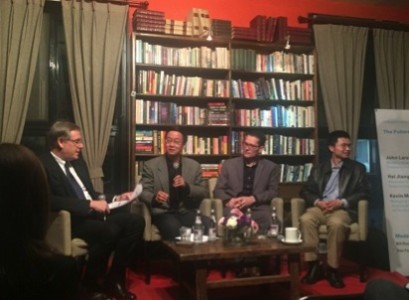
A growing middle class. Pollution. Grid lock. How are these factors shaping mobility in China? What solutions are being developed to ease mobility in China? How is mobility impacting and shaping lives today, and how will it in the future?
These were the questions discussed by Paulson Institute’s Managing Director of Climate & Sustainable Urbanization Kevin Mo and others on a panel moderated by Bill Russo, head of the automotive practice for Gao Feng Consulting’s Greater China office. Joining Mo on the panel were Mobility Director for Ford Motor Company in Asia Pacific John Larsen and Associate Professor of Industrial Engineering at Tsinghua University Hai Jiang.
The number of cities in the world with more than 10 million people, or megacities, increased from 10 to 28 between 1990 and 2014 – and the number continues to grow. The global middle class is expected to double from 2 billion to 4 billion by 2030, which will significantly increase the demand for cars. These factors are challenging the infrastructure and available transportation modes.
The panelists discussed China’s newly released urbanization guidelines, current opportunities and challenges for traditional automakers, innovative urban mobility solutions for China’s megacities, and the potential for the country to become a world leader in sustainable mobility.
Mo noted that for the past few decades, China’s city planning model has been based on a car-dependent, Soviet model dominated by big “super blocks” – often 500 meters long or more – and wide roads. The new urbanization guidelines, released last month, emphasize narrower roads and dense street networks, and emphasize increased public transit. Mo discussed the importance of high-speed rail systems as both an environmentally efficient mode of mobility, and one that will bring more economic benefits: “A centerpiece of the Jing-Jin-Ji integration plan is a huge expansion of high-speed rail, which will bring all the region’s major cities within an hour’s commute of each other,” Mo said. “With this increased mobility will come more integrated economic growth, more job options for people within the region.”
Ultimately, Mo believes China has the opportunity to leapfrog other countries when it comes to sustainability and green growth. There is no precedent for China to follow, he said – the country is “learning by doing.”
“China is taking an integrated approach to refocusing the economy in a way that tackles air quality, climate change, and a new model of growth together at the same time,” he said. “In using this integrated approach, China is in a position to show a model to the rest of the world for how to switch to sustainable economic development.”



